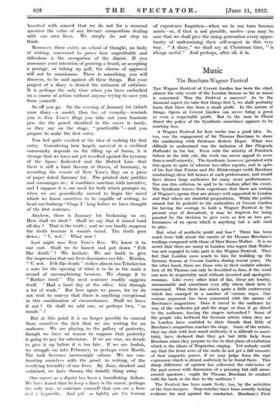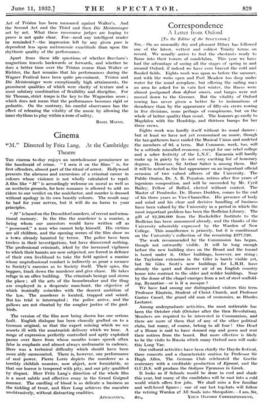Music The Beecham-Wagner Festival THE Wagner Festival at Covent Garden
has been the chief,
almost the only event of the London Season so far as music is concerned. Was the Festival a success? As to the financial aspect (to take first things first !), we shall probably learn that there has been a small profit. In the nature of things, Opera at Covent Garden can never bring a great or even a respectable profit. But to the man in Floral Street the policy of the Syndicate sometimes appears to be courting loss.
A Wagner Festival for four weeks was a good idea. So, too, was the engagement of Sir Thomas Beecham to share the conducting with Professor Robert Heger. What was difficult to understand was the inclusion of Der Fliegende Hollander in the list. Even with the artistry of Friedrich Schorr in the title role, the work can never appeal to more than a small minority. The Syndicate, however, persisted with this opera in spite of adverse box-office reports, and in spite of the fact that Tristan and Die Meistersinger (with Beecham conducting) drew full houses at each performance, and would have drawn large audiences for many more performances. Nor can this criticism be said to be wisdom after the event. The Syndicate knows from experience that there are certain of Wagner's operas that are always well supported in London and that others are doubtful propositions. While the public cannot but be grateful to the authorities at Covent Garden for having the courage to hold a Wagner Festival in the present year of discontent, it may be forgiven for being puzzled by the decision to give even so few as two per- formances of an opera which is anything but a safe card to play.
But what of aesthetic profit and loss ? There has been much loose talk about the merits of Sir Thomas Beecham's readings compared with those of Herr Bruno Walter. It is no secret that there are many in London who regret that Walter was not engaged to take part in the Wagner Festival. They feel that London owes much to him for building up the Gennan Season at Covent Garden during recent years. On the other hand, there are those who in their ecstatic admira- tion of Sir Thomas can only be described as fans, if the word can now be respectably used without inverted and apologetic commas. Like every other kind of fan, these are touchy, unreasonable and sometimes very silly where their hero is concerned. Thus there has arisen quite a little controversy which has emerged in a number of various ways. One curious argument has been concerned with the nature of Beecham's magnetism. Does it travel to the audience by way of the orchestra pit and the stage, or does it go direct to the audience, leaving the singers untouched ? Some of the people who befriend the German artists when they are in London have confided to their friends that little of Beecham's magnetism reaches the stage. Sonic of the artists, they say (but with how much authority it is difficult to ascer- tain), have declared that they get but little help from Beecham when they prepare to rise to that plane of exaltation which is the idiom of Wagnerian singing. Yet nobody could say that the front rows of the stalls do not get a MI measure of that magnetic power, if we may judge from the rapt expression which is almost uniformly to be found there. This sharp difference of opinion has enlivened the entr'actes of the past season with.discussion of a pressing but still mum" swered question : ought Sir Thomas Beecham to conduct with his back or his face to the audience ?
The Festival has been made lively, too, by the activities of the time-keepers. Stop-watches have been secretly ticking evidence for and against the conductor. Beechiun's First
Act of Tristan has been measured against Walter's. And the Second Act and the Third and then Die Meistersinger act by act. What these racecourse judges are hoping to prove is not quite clear. For—need any intelligent reader be reminded ?—the impression left by any given pace is dependent less upon metronomic exactitude than upon the rhythmic quality of the performance.
Apart from these idle questions of whether Beecham's magnetism travels backwards or forwards, and whether he does a better time over the Tristan course than Walter or Richter, the fact remains that his performances during the Wagner Festival have been quite pm-eminent. Tristan and Die Meistersinger were exceptionally high attainments, the prominent qualities of which were clarity of texture and a most salutary combination of flexibility and discipline. For Sir Thomas, strict tempo is the key to the Wagnerian score ; which does not mean that the performance becomes rigid or pedantic. On the contrary, his careful observance has the effect of releasing the vitality of the music by allowing the inner rhythms to play within a zone of safety.
BASIL MAINE.



































 Previous page
Previous page